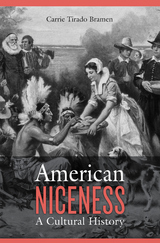
The cliché of the Ugly American—loud, vulgar, materialistic, chauvinistic—still expresses what people around the world dislike about their Yankee counterparts. Carrie Tirado Bramen recovers the history of a very different national archetype—the nice American—which has been central to ideas of U.S. identity since the nineteenth century.
Niceness is often assumed to be a superficial concept unworthy of serious analysis. Yet the distinctiveness of Americans has been shaped by values of sociality and likability for which the adjective “nice” became a catchall. In America’s fledgling democracy, niceness was understood to be the indispensable trait of a people who were refreshingly free of Old World snobbery. Bramen elucidates the role niceness plays in a particular fantasy of American exceptionalism, one based not on military and economic might but on friendliness and openness. Niceness defined the attitudes of a plucky (and white) settler nation, commonly expressed through an affect that Bramen calls “manifest cheerfulness.”
To reveal its contested inflections, Bramen shows how American niceness intersects with ideas of femininity, Native American hospitality, and black amiability. Who claimed niceness and why? Despite evidence to the contrary, Americans have largely considered themselves to be a fundamentally nice and decent people, from the supposedly amicable meeting of Puritans and Native Americans at Plymouth Rock to the early days of American imperialism when the mythology of Plymouth Rock became a portable emblem of goodwill for U.S. occupation forces in the Philippines.
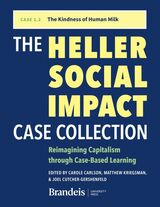
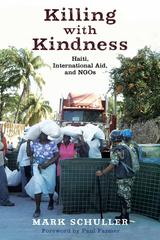
Winner of the 2015 Margaret Mead Award from the American Anthropological Association and the Society for Applied Anthropology
After Haiti’s 2010 earthquake, over half of U.S. households donated to thousands of nongovernmental organizations (NGOs) in that country. Yet we continue to hear stories of misery from Haiti. Why have NGOs failed at their mission?
Set in Haiti during the 2004 coup and aftermath and enhanced by research conducted after the 2010 earthquake, Killing with Kindness analyzes the impact of official development aid on recipient NGOs and their relationships with local communities. Written like a detective story, the book offers rich ethnographic comparisons of two Haitian women’s NGOs working in HIV/AIDS prevention, one with public funding (including USAID), the other with private European NGO partners. Mark Schuller looks at participation and autonomy, analyzing donor policies that inhibit these goals. He focuses on NGOs’ roles as intermediaries in “gluing” the contemporary world system together and shows how power works within the aid system as these intermediaries impose interpretations of unclear mandates down the chain—a process Schuller calls “trickle-down imperialism.”

This book includes guidance as well as information and inspiration. There are practical recommendations on how to perform acts of kindness in personal lives and at work, toward friends, colleagues, and family members—even with one's enemies. Suggestions are also offered on ways to encourage others to be kind so they, too, can experience the joy that results.
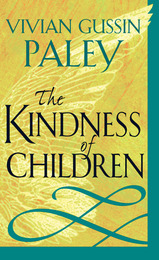
Visiting a London nursery school, Vivian Paley observes the schoolchildren's reception of another visitor, a handicapped boy named Teddy, who is strapped into a wheelchair, wearing a helmet, and barely able to speak. A predicament arises, and the children's response--simple and immediate--offers Paley the purest evidence of kindness she has ever seen.
In subsequent encounters, "the Teddy story" draws forth other tales of impulsive goodness from Paley's listeners. Just so, it resonates through this book as one story leads to another--taking surprising turns, intersecting with the narrative unfolding before us, and illuminating the moral meanings that children may be learning to create among themselves.
Paley's journey takes us into the different worlds of urban London, Chicago, Oakland, and New York City, and to a close-knit small town in Michigan's Upper Peninsula. Her own story connects those of children from nursery school to high school, and circles back to her elderly mother, whose experiences as a frightened immigrant girl, helped through a strange school and a new language by another child, reappear in the story of a young Mexican American girl. Thus the book quietly brings together the moral life of the very young and the very old. With her characteristic unpretentious charm, Paley lets her listeners and storytellers take us down unexpected paths, where the meeting of story and real life make us wonder: Are children wiser about the nature of kindness than we think they are?
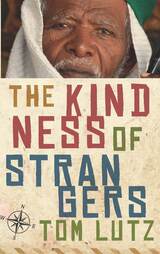
You may never visit these places, but Tom Lutz will do it for you. And while global media may serve up a steady diet of division, violence, oppression, hatred, and strife, The Kindness of Strangers shows that people the world over are much more likely to meet strangers with interest, empathy, welcome, and compassion.
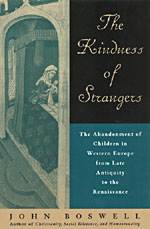
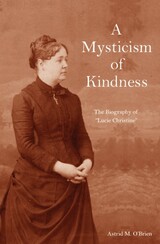
On the surface, Lucie Christine—the pseudonym given to a nineteenth-century Frenchwoman named Mathilde Boutle—was a very ordinary upper-middle-class woman, fulfilling her daily responsibilities to her husband and children. But underneath, Lucie Christine was an extraordinary human being. In A Mysticism of Kindness, Astrid M. O’Brien tells the life story of this remarkable woman, revealing how her experiences as a mystic allowed her to persevere as a wife and mother in the midst of constant verbal and physical abuse from her alcoholic husband. Her story will inspire all those who struggle to find a way to live a strong spiritual life in an often difficult and troubling world.
READERS
Browse our collection.
PUBLISHERS
See BiblioVault's publisher services.
STUDENT SERVICES
Files for college accessibility offices.
UChicago Accessibility Resources
home | accessibility | search | about | contact us
BiblioVault ® 2001 - 2024
The University of Chicago Press









